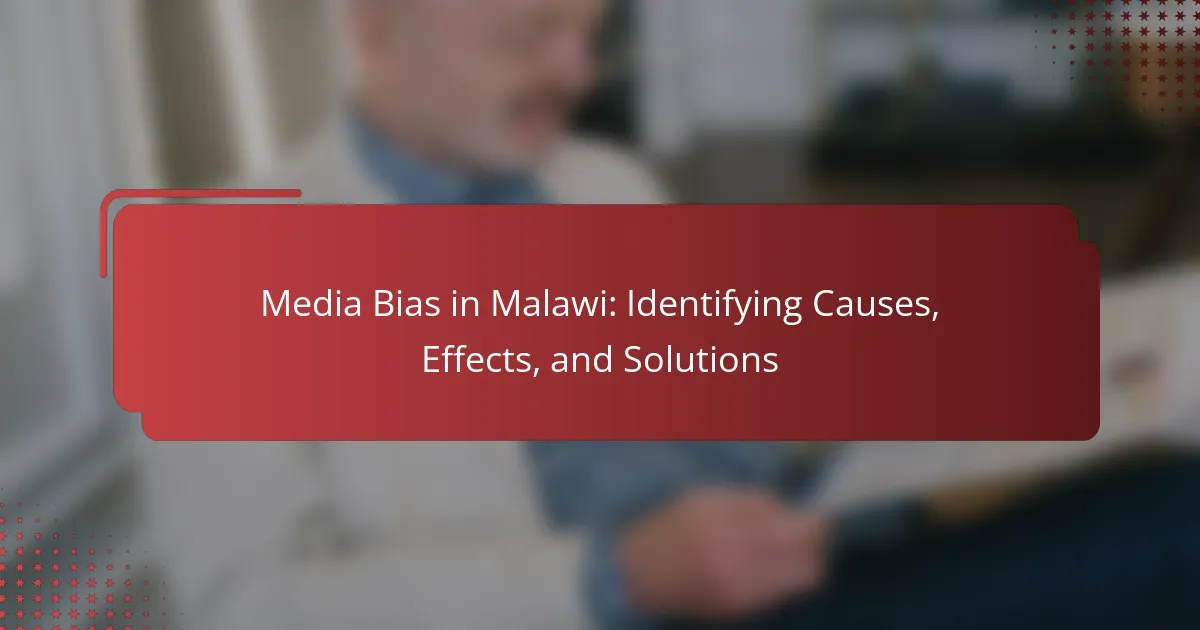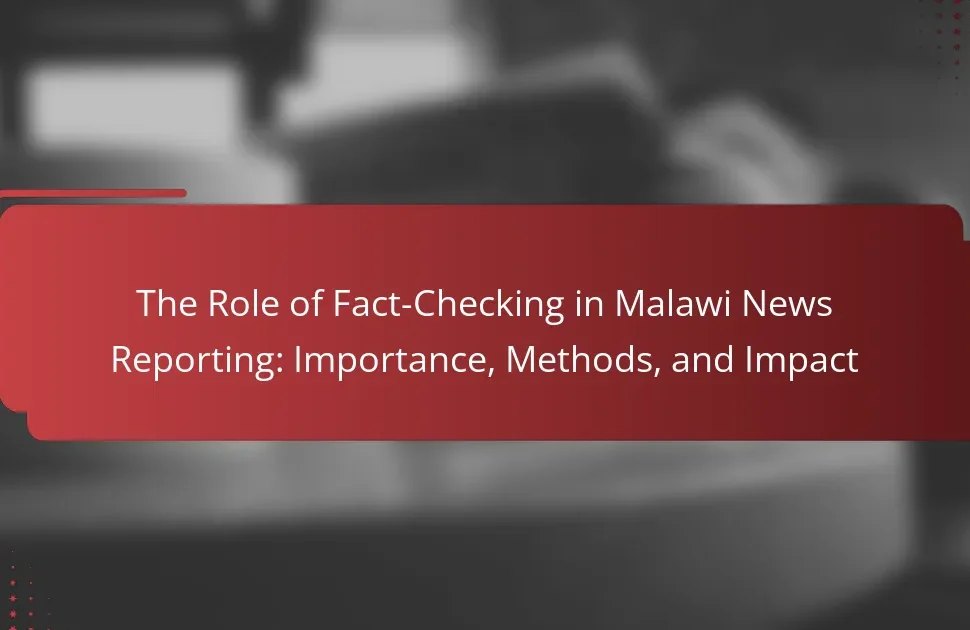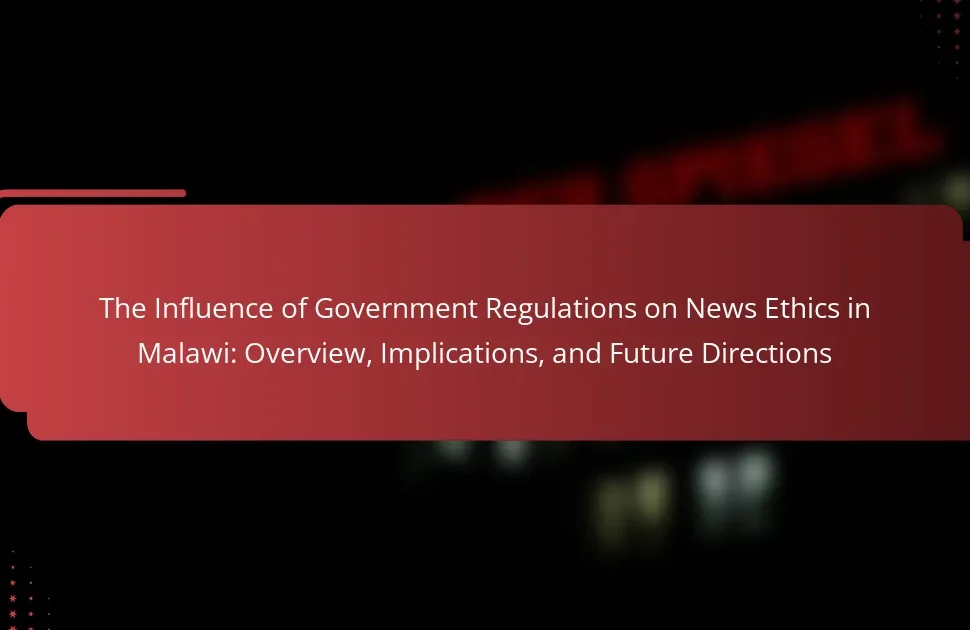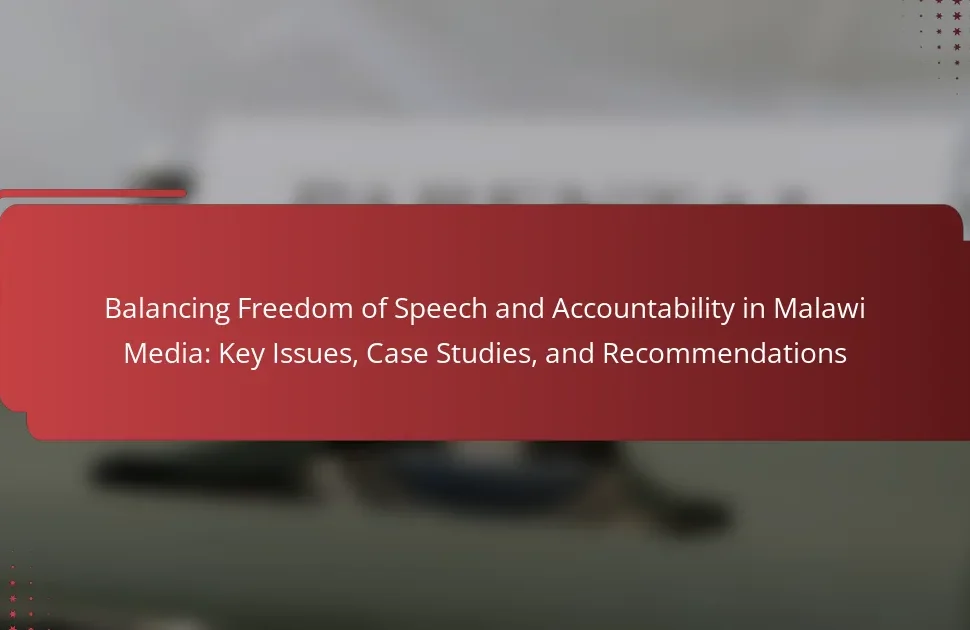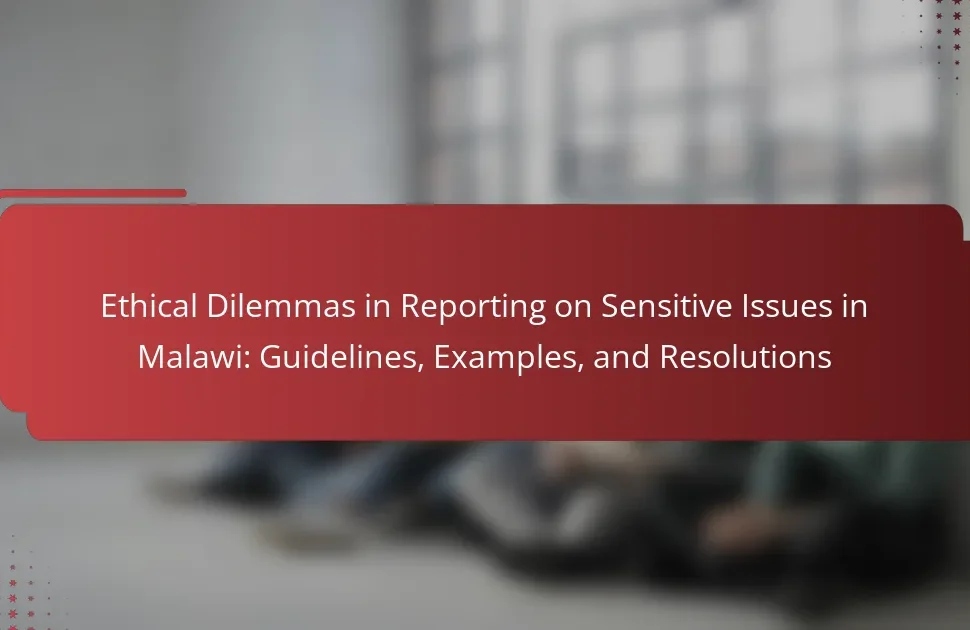Media bias in Malawi refers to the partiality exhibited by media outlets in their news reporting, often influenced by political interests and ownership structures. This bias can manifest through selective coverage and the promotion of specific political agendas, leading to misinformation and a polarized public. State-owned media typically align with government narratives, while private media may favor opposition viewpoints, contributing to a lack of trust among citizens. The article explores the causes of media bias, including political pressure, ownership concentration, and economic constraints, as well as its consequences for democratic processes. Additionally, it discusses potential solutions to mitigate media bias, such as promoting media literacy, supporting independent journalism, and encouraging diverse media ownership.
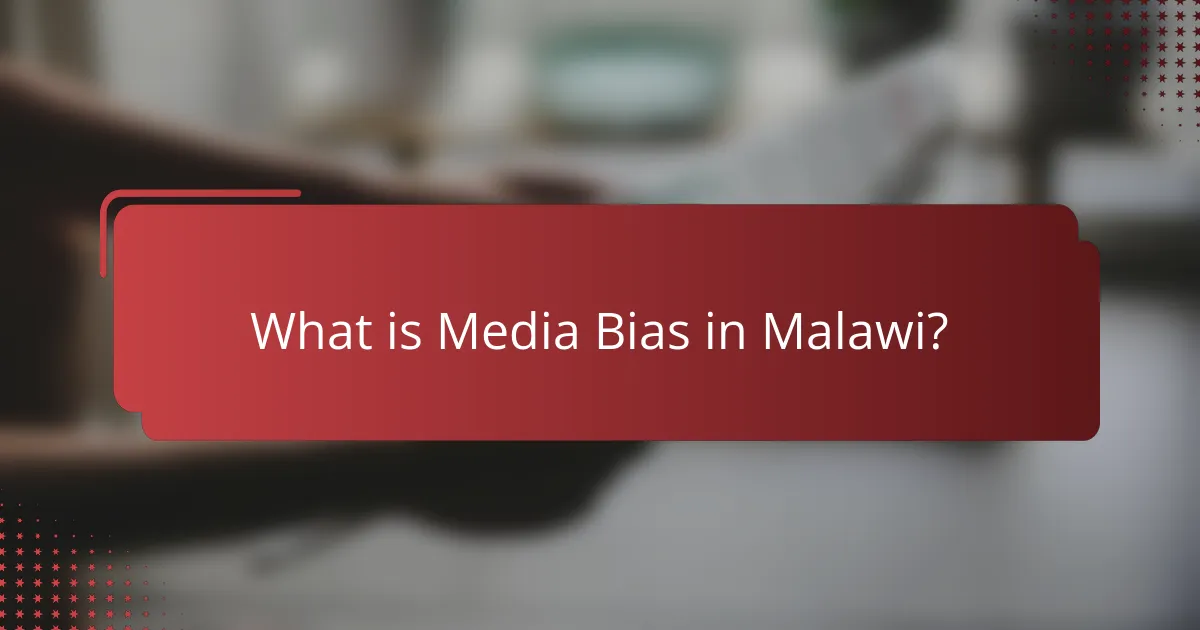
What is Media Bias in Malawi?
Media bias in Malawi refers to the partiality shown by media outlets in reporting news and information. This bias can manifest through selective coverage, framing of stories, or the promotion of specific political agendas. In Malawi, media bias often reflects the interests of powerful political figures or parties. Studies indicate that state-owned media tend to favor government narratives. Conversely, private media may exhibit bias towards opposition viewpoints. The consequences of media bias include misinformation and a polarized public. Such dynamics can undermine democratic processes and informed citizenry.
How is media bias defined in the context of Malawi?
Media bias in the context of Malawi is defined as the tendency of media outlets to present information in a way that favors specific political, social, or economic interests. This bias can manifest through selective reporting, framing of news stories, and the omission of critical perspectives. For instance, during election periods, some media may favor certain political parties, influencing public perception. The 2019 elections in Malawi highlighted instances where media coverage was skewed, impacting voter behavior. Such bias can undermine democratic processes and limit the public’s access to balanced information.
What are the common forms of media bias observed in Malawi?
Common forms of media bias observed in Malawi include political bias, ownership bias, and sensationalism. Political bias occurs when media outlets favor specific political parties or figures. This often leads to unbalanced reporting and a lack of diverse viewpoints. Ownership bias arises when media organizations reflect the interests of their owners, impacting news coverage. Sensationalism involves exaggerating stories to attract attention, often at the expense of factual reporting. These biases can distort public perception and influence political discourse in the country.
How does media bias differ from other forms of bias?
Media bias differs from other forms of bias primarily in its influence on public perception and information dissemination. Media bias specifically refers to the slant or distortion in reporting that affects how news is presented. This can shape audience opinions and beliefs in ways that other biases, like personal or cognitive bias, do not. For instance, media bias can stem from ownership interests, political affiliations, or societal pressures that lead to selective reporting. Research shows that biased media coverage can lead to significant public misperceptions, as seen in studies analyzing election coverage. This demonstrates that while all biases can distort reality, media bias uniquely impacts collective societal understanding and behavior through its widespread reach and authority.
What are the historical roots of media bias in Malawi?
Media bias in Malawi has historical roots stemming from colonial rule and political instability. During British colonialism, media was heavily controlled and served government interests. This led to a lack of independent journalism and biased reporting. After independence in 1964, President Hastings Kamuzu Banda established a one-party state, further restricting media freedom. Government censorship and propaganda became prevalent during this era. The media landscape remained biased, favoring the ruling party and suppressing dissenting voices. Following democratic reforms in the 1990s, while some improvements occurred, remnants of bias persisted due to political affiliations and ownership influences. These historical factors continue to shape media practices in Malawi today.
How has Malawi’s political history influenced media bias?
Malawi’s political history has significantly influenced media bias through government control and censorship. During the one-party state era under Hastings Banda, media outlets were heavily regulated. This resulted in a lack of independent journalism and biased reporting favoring the ruling party. After the transition to multiparty democracy in the 1990s, media freedom increased, but political affiliations still affected reporting. Journalists often faced pressure from political leaders, leading to self-censorship. Additionally, partisan ownership of media outlets perpetuated bias, as owners often aligned with specific political parties. The historical context of political repression has created an environment where media bias continues to thrive in Malawi.
What role did colonialism play in shaping media practices in Malawi?
Colonialism significantly influenced media practices in Malawi. During the colonial era, the British established control over communication channels. They prioritized English-language newspapers and radio, marginalizing local languages and voices. This created a media landscape that favored colonial narratives. The British also censored content that opposed their rule. Consequently, media became a tool for propaganda rather than a platform for diverse viewpoints. After independence, the legacy of this colonial media structure persisted. Local media struggled to gain independence from colonial influences, affecting their credibility and representation.
What are the implications of media bias in Malawi?
Media bias in Malawi leads to misinformation and public distrust. Biased reporting skews public perception of political events and social issues. This can influence voter behavior and policy support. Furthermore, it can exacerbate divisions within society. For example, biased coverage may favor certain political parties over others. This creates an uneven playing field in the democratic process. Additionally, media bias can hinder accountability among leaders. When the media fails to report objectively, corruption may go unchecked. Ultimately, these implications threaten the integrity of Malawi’s democratic institutions.
How does media bias affect public opinion and perception?
Media bias significantly influences public opinion and perception. It shapes how information is presented and interpreted by audiences. Biased reporting can lead to skewed perceptions of events and issues. For example, a study by the Pew Research Center found that 62% of Americans believe news organizations favor one side in their reporting. This perception can deepen political polarization. When media outlets consistently present a particular viewpoint, it can reinforce existing beliefs. Consequently, audiences may become less open to differing perspectives. This phenomenon can undermine informed public discourse. Overall, media bias plays a critical role in shaping societal attitudes and beliefs.
What impact does media bias have on democratic processes in Malawi?
Media bias negatively impacts democratic processes in Malawi by distorting public perception and influencing voter behavior. Biased reporting can create an uneven playing field for political candidates. This leads to misinformation about policies and candidates. Consequently, voters may make decisions based on skewed narratives rather than factual information. Studies indicate that media bias can suppress political participation among marginalized groups. Furthermore, it can exacerbate divisions within society, undermining social cohesion. Overall, media bias threatens the integrity of elections and democratic governance in Malawi.
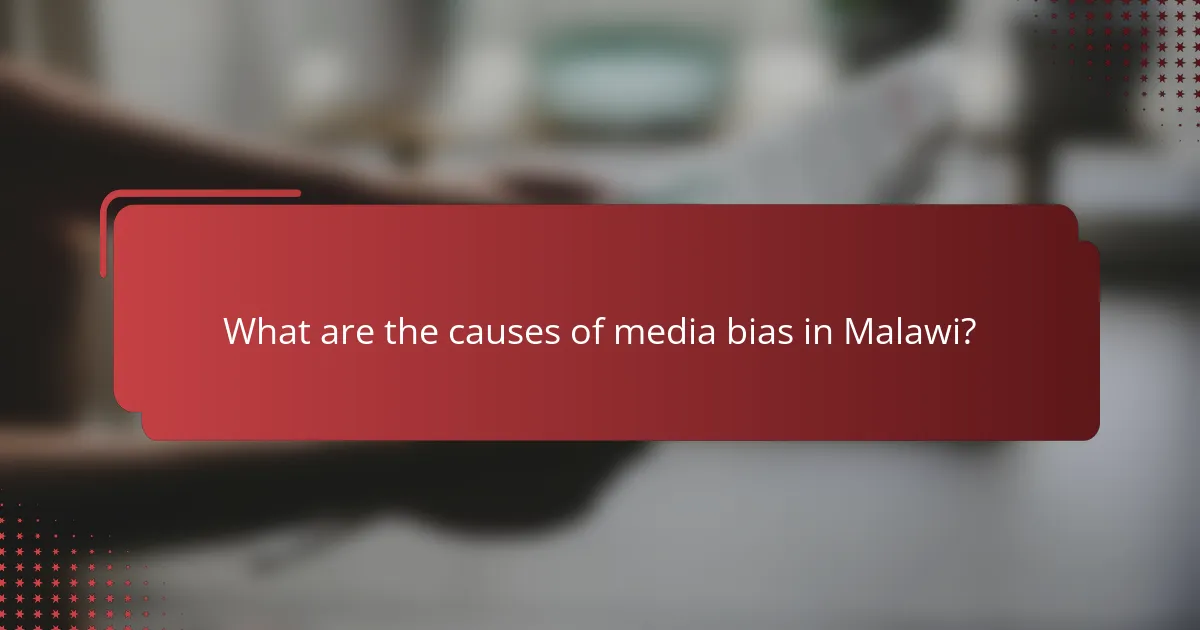
What are the causes of media bias in Malawi?
Media bias in Malawi is primarily caused by political influence and ownership of media outlets. Political parties often exert pressure on journalists to report favorably or suppress negative information. Ownership concentration leads to conflicts of interest, as media owners may prioritize their political affiliations over impartial reporting. Economic constraints also play a role; many journalists face financial pressures that can sway their reporting. Additionally, a lack of journalistic training contributes to biased reporting, as some journalists may lack the skills to present balanced perspectives. Furthermore, societal factors, such as ethnic divisions, can influence media narratives, leading to partial coverage of events.
Why do media organizations in Malawi exhibit bias?
Media organizations in Malawi exhibit bias due to political influence and economic pressures. Many media outlets rely on government funding or advertising revenue from businesses with political affiliations. This dependence can lead to skewed reporting that favors certain political parties or interests. Additionally, journalists often face threats or intimidation, which can compromise their objectivity. Research indicates that media bias is prevalent in countries with limited press freedom, like Malawi. According to the 2021 Freedom House report, Malawi’s media landscape is marked by challenges that hinder impartial journalism. These factors collectively contribute to the biased portrayal of news and events in the country.
What economic factors contribute to media bias in Malawi?
Economic factors contributing to media bias in Malawi include limited funding and ownership concentration. Many media outlets rely on advertising revenue, which can lead to biased reporting favoring advertisers. Additionally, ownership by a few wealthy individuals influences editorial decisions. Economic instability in Malawi restricts resources for investigative journalism. Low journalist salaries can result in compromised integrity. The lack of diverse funding sources further exacerbates the issue, limiting independent reporting. These factors create an environment where media bias is prevalent, affecting public perception and trust.
How do political affiliations influence media reporting?
Political affiliations significantly influence media reporting by shaping the narratives and perspectives presented in news coverage. Media outlets often align with specific political ideologies, which affects their selection of stories. For instance, journalists may emphasize certain issues that resonate with their political base while downplaying others. This alignment can result in biased reporting, where facts are selectively highlighted or omitted. Studies show that in Malawi, media outlets affiliated with particular political parties may exhibit favoritism towards those parties during elections. This bias can lead to public misinformation and a polarized media landscape. Research conducted by the Malawi Chapter of the Media Institute of Southern Africa highlights the prevalence of partisan reporting in the country’s media.
What role do journalists play in perpetuating media bias?
Journalists play a significant role in perpetuating media bias through selective reporting and framing of news stories. They often choose which events to cover and how to present them, influencing public perception. This selection process can reflect their own beliefs or the interests of their employers. For instance, studies have shown that journalists may emphasize certain viewpoints while downplaying others, leading to an imbalanced representation of issues. In Malawi, this can affect how political events and social issues are portrayed in the media. Furthermore, the reliance on specific sources can reinforce existing biases, as journalists may favor voices that align with their narrative. This practice can result in a lack of diverse perspectives, ultimately shaping the audience’s understanding of critical issues.
How does journalist training impact their reporting style?
Journalist training significantly impacts reporting style by instilling essential skills and ethical standards. Trained journalists learn to prioritize accuracy, objectivity, and clarity in their writing. This training often includes understanding the importance of fact-checking and sourcing information responsibly. As a result, their reports tend to be more reliable and informative. Furthermore, training programs emphasize the need for balanced perspectives, which helps reduce bias in reporting. Studies show that journalists with formal training are less likely to exhibit personal biases in their stories. This leads to a more trustworthy media environment, especially in contexts like Malawi, where media bias can influence public perception and democracy.
What ethical dilemmas do journalists face in Malawi?
Journalists in Malawi face several ethical dilemmas, including censorship, political pressure, and safety concerns. Censorship limits the freedom to report on sensitive issues. Political pressure often comes from government officials seeking to influence coverage. Safety concerns arise from threats and violence against journalists. These dilemmas hinder the ability to provide unbiased and comprehensive news. For instance, the Committee to Protect Journalists reports incidents of harassment and intimidation. Such challenges can compromise journalistic integrity and public trust in the media.
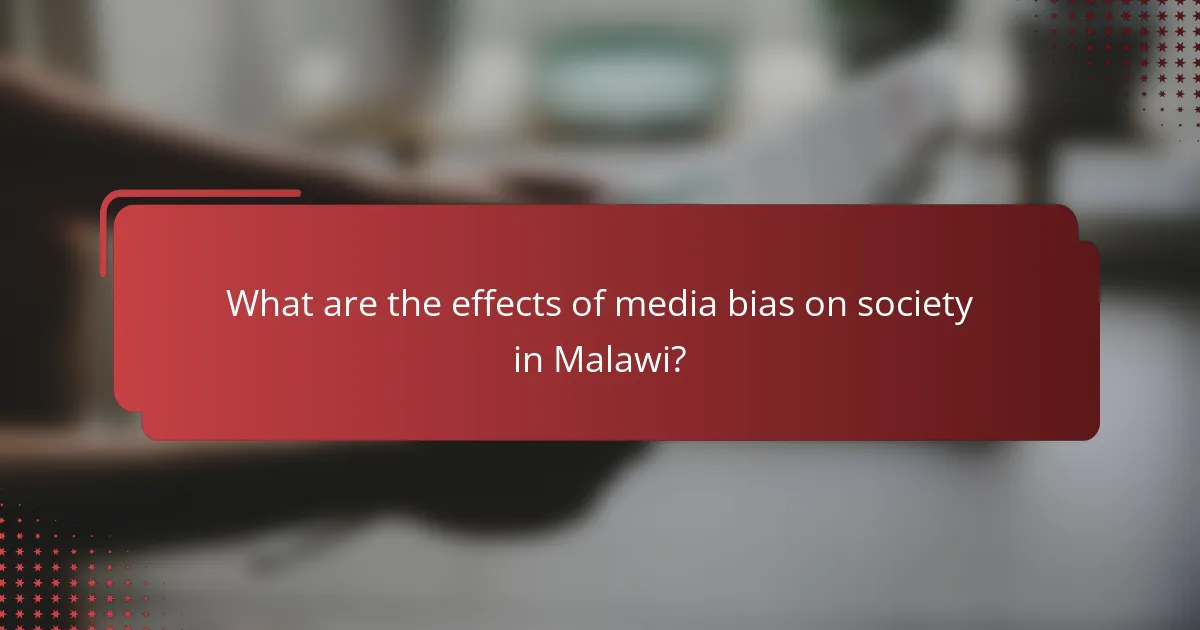
What are the effects of media bias on society in Malawi?
Media bias in Malawi leads to misinformation and polarized public opinion. Biased reporting can distort facts, influencing how citizens perceive political issues. This can result in a lack of trust in media outlets. Consequently, citizens may rely on alternative sources, which may also be biased. In 2020, a study found that 64% of Malawians felt media bias affected their understanding of current events. Such bias can exacerbate social divisions and hinder democratic discourse. Ultimately, the effects of media bias can undermine informed decision-making in society.
How does media bias shape public discourse?
Media bias shapes public discourse by influencing perceptions and opinions on various issues. Biased reporting can create a skewed understanding of events. For instance, a study by the Pew Research Center found that 62% of Americans believe media outlets favor one side of political issues. This favoritism can polarize audiences and deepen societal divisions. Biased narratives often lead to misinformation, as audiences may only receive one perspective. Consequently, public discourse becomes less informed and more emotionally charged. This dynamic affects civic engagement, as individuals may disengage from discussions perceived as biased. Overall, media bias significantly impacts the quality and nature of public discourse.
What are the consequences of biased reporting on social cohesion?
Biased reporting negatively impacts social cohesion. It fosters division among communities by amplifying existing tensions. Biased narratives can lead to mistrust between different social groups. This mistrust undermines collaboration and community initiatives. Furthermore, biased reporting can distort public perception of events. It may create an environment where misinformation thrives. This misinformation can escalate conflicts and hinder resolution efforts. Research shows that communities with high media bias experience increased polarization. Such polarization can weaken the social fabric and reduce overall societal stability.
How does media bias affect marginalized communities in Malawi?
Media bias negatively impacts marginalized communities in Malawi by perpetuating stereotypes and misrepresenting their issues. Biased reporting often leads to a lack of visibility for these communities in mainstream media. This can result in their concerns being overlooked by policymakers. Furthermore, media bias can foster discrimination and social stigma against marginalized groups. For example, minority ethnic groups may be portrayed in a negative light, affecting public perception. Research indicates that biased media portrayal can hinder access to resources and support for these communities. Consequently, marginalized voices struggle to gain representation and advocate for their rights effectively.
What are the psychological effects of media bias on the audience?
Media bias can significantly influence the psychological state of the audience. It often leads to confirmation bias, where individuals favor information that aligns with their pre-existing beliefs. This can create polarized views among different groups. Audiences may also experience increased anxiety and distrust towards opposing viewpoints. A study by the Pew Research Center found that 62% of Americans feel that media bias negatively impacts public discourse. Furthermore, media bias can contribute to a sense of helplessness among audiences, as they may feel overwhelmed by conflicting narratives. This can lead to disengagement from important societal issues. Overall, the psychological effects of media bias can hinder critical thinking and promote divisiveness within communities.
How does exposure to biased media influence individual beliefs?
Exposure to biased media significantly influences individual beliefs by reinforcing existing opinions and shaping perceptions. Biased media often presents information in a way that favors one perspective over others. This selective presentation can lead individuals to adopt those favored beliefs as their own. Research shows that repeated exposure to biased information strengthens cognitive biases, making individuals more resistant to opposing viewpoints. A study by the Pew Research Center found that individuals who consume partisan media are more likely to hold polarized views. This effect is particularly pronounced in environments with limited access to diverse information sources.
What are the long-term effects of media bias on trust in media?
Long-term effects of media bias on trust in media include decreased credibility and increased skepticism among audiences. When media outlets consistently demonstrate bias, audiences may perceive them as unreliable. This perception can lead to a decline in consumer engagement with news sources. Research indicates that prolonged exposure to biased reporting can polarize public opinion. Audiences may gravitate towards sources that align with their views, further entrenching divisions. A study by the Pew Research Center found that 62% of Americans believe news organizations favor one side. This perception can diminish the overall trust in journalism as a profession. Over time, this erosion of trust can hinder the media’s role in democracy and informed public discourse.
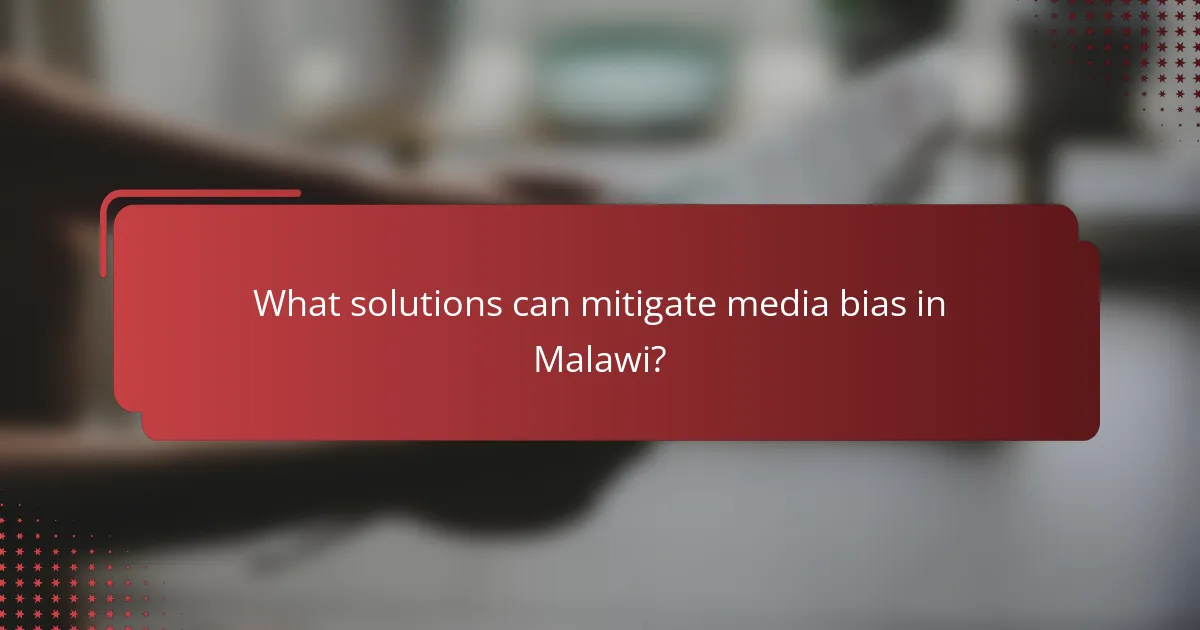
What solutions can mitigate media bias in Malawi?
Promoting media literacy among the public can mitigate media bias in Malawi. Educating citizens on how to critically evaluate news sources is essential. Training programs can be implemented in schools and communities. These programs should focus on identifying credible information and recognizing bias. Encouraging diverse media ownership can also help. A variety of perspectives can reduce the influence of single narratives. Supporting independent journalism is crucial for balanced reporting. Funding initiatives for investigative journalism can enhance accountability. Collaboration between media organizations can foster shared standards. These solutions can collectively improve media integrity in Malawi.
How can media literacy improve the situation in Malawi?
Media literacy can improve the situation in Malawi by empowering citizens to critically analyze information. It helps individuals discern credible sources from misinformation. Enhanced media literacy fosters informed decision-making among the population. This can lead to greater civic engagement and participation in democratic processes. Studies show that media literacy reduces susceptibility to propaganda and bias. For instance, research by the Media Literacy Coalition indicates that educated consumers of media are less likely to believe false narratives. Additionally, improved media literacy can strengthen accountability among media outlets. When the public is informed, they can demand higher standards from journalists. Ultimately, media literacy promotes a more informed society, contributing to social cohesion and stability in Malawi.
What programs exist to educate the public about media bias?
Programs that educate the public about media bias include Media Literacy programs, Fact-Checking initiatives, and Journalism training workshops. Media Literacy programs aim to enhance critical thinking regarding news consumption. Fact-Checking initiatives, like Snopes and PolitiFact, provide resources to verify information accuracy. Journalism training workshops often focus on ethical reporting and unbiased news presentation. Organizations such as the International Center for Journalists (ICFJ) and the Media Institute of Southern Africa (MISA) offer specific courses to address these issues. These programs are essential for fostering informed citizens in the context of media bias.
How can critical thinking skills be fostered among audiences?
Critical thinking skills can be fostered among audiences through targeted educational programs. These programs should emphasize analytical skills, logical reasoning, and problem-solving techniques. Workshops and seminars can provide interactive environments for practice. Incorporating case studies relevant to media bias can enhance engagement. Encouraging discussions around current events promotes critical evaluation of information. Providing access to diverse perspectives helps audiences recognize bias. Utilizing multimedia resources can cater to different learning styles. Research shows that active learning increases retention and application of critical thinking skills.
What role can policy play in reducing media bias?
Policy can play a significant role in reducing media bias. It can establish regulations that promote fairness and accuracy in reporting. For instance, policies can require media outlets to adhere to ethical standards. These standards can include balanced representation of different viewpoints. Additionally, policies can provide funding for independent journalism. This funding can support investigative reporting that uncovers bias. Evidence shows that countries with strong media regulations tend to have less biased reporting. For example, the Media Council of Malawi aims to promote responsible journalism. This initiative can help create a more informed public. Overall, effective policy can foster an environment that minimizes media bias.
What regulations could be implemented to promote fair reporting?
Implementing regulations such as mandatory fact-checking standards can promote fair reporting. These standards would require media outlets to verify information before publication. Additionally, establishing an independent regulatory body can oversee compliance with reporting standards. This body could enforce penalties for misinformation. Transparency requirements for sources can also enhance accountability. Media organizations should disclose funding sources and potential conflicts of interest. Training programs on ethical journalism can further support fair reporting practices. Countries like Canada have implemented similar measures to improve media integrity.
How can government transparency contribute to unbiased media?
Government transparency can contribute to unbiased media by providing accurate information to journalists. When governments share data openly, it reduces the chances of misinformation. Journalists can verify facts and present balanced reporting. Access to transparent information fosters accountability and trust. This transparency encourages media outlets to report objectively rather than relying on speculation. Studies show that countries with higher government transparency have more reliable media. For instance, the 2021 World Press Freedom Index highlights that transparency correlates with reduced media bias. Thus, government transparency is essential for fostering an unbiased media landscape.
What practical steps can individuals take to combat media bias?
Individuals can combat media bias by diversifying their news sources. Consuming information from multiple outlets helps identify differing perspectives. Engaging with independent and international media can provide alternative viewpoints. Fact-checking claims through reliable organizations enhances understanding of accuracy. Participating in discussions with others encourages critical thinking about media content. Supporting media literacy programs fosters informed consumption of news. Advocating for transparency in journalism promotes accountability among media organizations. These steps collectively empower individuals to recognize and mitigate bias in media reporting.
How can consumers of media critically evaluate news sources?
Consumers of media can critically evaluate news sources by assessing credibility, bias, and accuracy. They should check the author’s qualifications and the publication’s reputation. Analyzing the language used in articles can reveal bias. Fact-checking claims against reliable sources is essential for accuracy. Cross-referencing information with multiple outlets helps identify discrepancies. Consumers should be aware of the source’s funding and ownership, as it may influence content. Understanding the context of the news can also aid in evaluation. These steps empower consumers to make informed judgments about the news they consume.
What are the best practices for sharing information responsibly?
Best practices for sharing information responsibly include verifying facts before dissemination. Fact-checking ensures accuracy and reduces misinformation. Citing credible sources enhances the reliability of shared information. Transparency about the origin of information builds trust with the audience. Using clear and simple language aids comprehension. Respecting privacy and confidentiality is crucial when sharing sensitive information. Engaging in constructive dialogue promotes understanding and prevents conflict. Adhering to ethical guidelines fosters responsible communication.
Media bias in Malawi refers to the partiality exhibited by media outlets in their news reporting, often favoring specific political interests and reflecting the influence of powerful figures. The article explores the definitions, common forms, and historical roots of media bias, highlighting its implications for public perception, democratic processes, and marginalized communities. It examines the causes of media bias, including political influence and economic pressures, and discusses the role of journalists in perpetuating biased narratives. Finally, the article proposes solutions such as promoting media literacy, implementing regulations, and encouraging diverse ownership to mitigate the effects of media bias in Malawi.
